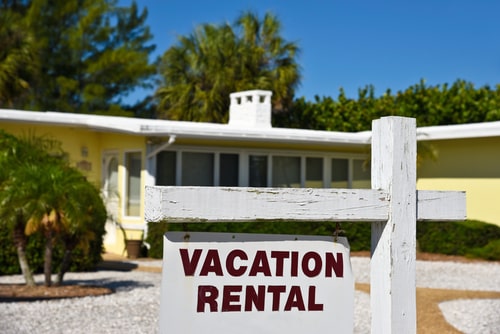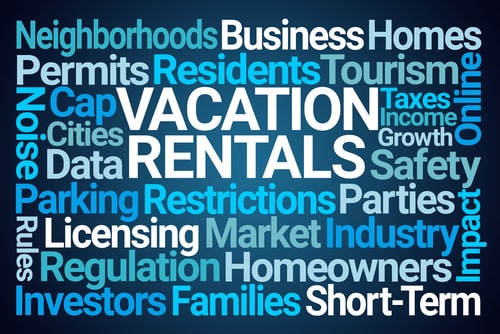
Over the last several years, short-term rentals have grown in popularity with both renters and investors. But is it the right move for an investment portfolio? The answer depends on many factors, including how much time the owner intends to commit and how secure they need their investment to be. That said, one thing is for sure, the over $80 billion-dollar short-term rental market is not going anywhere anytime soon. To help decide if this is the right investment move for you, we discuss the pros and cons along with key things every owner should consider.
What is the Difference Between Long and Short-Term Rentals?
Not all rental income is created equal, and there are some key differences between long- and short-term rentals. Long-term rentals offer a more stable and permanent living solution. Generally, these units rent unfurnished and involve extensive tenant screening and signing a lease of between 12 to 24 months.
On the other hand, short-term rentals, also known as vacation rentals, lease on a daily or weekly rate. Typically, these units are furnished and offer an attractive alternative to generic hotels. The space and amenities offered in a short-term rental make them popular for adventure travel, family vacations, and honeymoons.
 Are Short-Term Rentals Right for You?
Are Short-Term Rentals Right for You?
Any rental investment endeavor will require time, money, and due diligence. However, that is where most similarities between long- and short-term rentals end. Before choosing to invest in vacation rentals, you may want to ask yourself the questions below –
- Is the property in a desirable location, city, or tourist area? – Homes or units in desirable tourist spots can charge more and are likely to have a lower vacancy rate. That said, there is also more competition.
- How much work will the property need to become rent-ready? (For example, repairs, cleaning, and furnishings)
- Where do you live in relation to the rental? – Remember, if you do not hire a qualified property manager, you as the owner need to be reachable for your guests or emergencies.
- How much time are you prepared to commit? – Catering to guests, coordinating reservations, marketing, completing maintenance, and cleaning after each occupant takes time. So, owners need to prepare for this time commitment or the cost to hire outside vendors.
- Can you afford the rental costs if there is a higher vacancy rate? – Unlike long-term rentals, vacation homes are more transient, and therefore rent is not guaranteed. Depending on location, most tourist areas will see busier months followed by periods of lower demand.
Above are just some of the considerations landlords must evaluate before investing in vacation rentals. Continue reading as we review additional concerns and advice if you think this is the rental market for you!
9 Things Every Landlord Should Know About Short-Term Rentals
Knowledge is power, especially when it comes to what is or is not a good investment. Whether you view purchasing a vacation rental as part of a retirement portfolio or just offset the mortgage costs of a second home, there are many things to prepare for. Researching the local area along with potential restrictions and obstacles is critical to success. So, check out this list of things every landlord should know before investing in short-term rentals.
- Understand Limiting Regulations and Laws
- Choose the Right Realtor
- Prioritize Turn-Key Listings
- Research Tourism Statistics
- Features, Features, Features!
- Calculate Income Potential
- Avoid Over Saturation
- Prepare for Occupancy Taxes
- Anticipate Expenses
Understand Limiting Regulations and Laws
Local laws, regulations, and ordinances will play an important role in the success of your investment. Failing to research and plan for these requirements will create a lot of headaches later on. Also, keep in mind the regulations for short and long-term rental are not the same. So, check HOA and municipal restrictions specific to short-term vacation rentals. The last thing any investor wants is to purchase a rental property in an area that does not allow this type of use.
Choose the Right Realtor
There are a lot of great realtors out there to assist buyers with their home needs. However, buying an investment property presents unique challenges. For example, a successful investment hinges on profitability as a rental, and your realtor must be comfortable sending many offers that may not be accepted. Therefore, a realtor with some experience working with investors is ideal. That way, the realtor can offer insight on supply and demand, tourism potential, and local regulations.
 Prioritize Turn-Key Listings
Prioritize Turn-Key Listings
Whenever an investor can purchase an existing and successful short-term rental property, it presents a great opportunity. Instead of calculating the potential of converting a home to a vacation destination, existing rentals offer valuable insight. Investors can use historical data over the past few years to gauge earning potential, average vacancy rate, and typical maintenance costs. However, successful rentals may have a price tag above the market rate. So, doing your due diligence is critical to deciding whether that price is worth it in the long run.
Research Tourism Statistics
Not every popular destination is popular year-round. So, depending on location, your rental may be slow and steady throughout the year or consist of 4 to 5 months of high occupancy at great rates. Therefore, seeking statistical information from the local tourism board may help investors determine the volume and trends of guests coming to town. This vital data could play a significant role in making your decision to buy in one area versus another.
Features, Features, Features!
Like a long-term rental, short-term rentals benefit from desirable features and amenities. After all, this is one of the benefits renters see in choosing this type of vacation retreat instead of a hotel. Therefore, it is critical that investors understand the market in the area they plan to purchase. For example, a property in Miami benefits greatly from a beach view, while someone renting in New York may be swayed by included parking.
Calculate Income Potential
Earning a healthy rental income is the goal of any investor, and short-term rentals can be lucrative. For instance, a mid-range rental can fetch $150 to $200 per night. Furthermore, a luxury property in a desirable destination can bring in several thousand per month. The key here is to calculate potential expenses and prepare a budget accurately. Moreover, consider what rental rate you may charge based on local competition and what occupancy rate you would need to cover expenses and turn a profit. Then, ask yourself if that occupancy rate is truly doable?
 Avoid Over Saturation
Avoid Over Saturation
As the popularity of short-term rental rises, many urban areas and popular destinations have become saturated with listings. That said, it does not mean there is no money to be made, only that competition is a factor. When researching other listings in the area on popular sites like Airbnb and VRBO, be sure to look at the occupancy of listings far down in the rankings. This will offer the most accurate picture of what to expect, especially just starting.
Prepare for Occupancy Taxes
Paying taxes on a rental property is no surprise. However, short-term rentals may also be subject to local or state occupancy taxes. That said, owners can take advantage of several write-offs and deductions that lower their overall tax liability. Always consult with a licensed tax professional to get the most from your rental investment business.
Anticipate Expenses
Expenses can quickly wipe away potential profits, and keeping them in check is essential. So, for example, investors should plan and budget for the following –
- Principal and Mortgage Interest
- Utilities
- Taxes
- Landlord or Short-Term Rental Insurance
- Regular Cleaning Service
- Entertainment Subscriptions (Cable, Netflix, Hulu, Disney+)
- Furnishings throughout the unit
- Welcome Baskets
- Consumable Supplies (toilet paper, detergent, bath products)
- Landscaping Maintenance
- General Repairs and Emergency Fund
The Pros and Cons of Short-Term Rentals
Finding a place to stay while traveling used to be limited to local hotels, but times have changed! Investors everywhere are jumping on the potentially lucrative bandwagon of short-term rentals. However, like every investment, short-term rentals have their benefits and disadvantages. Let’s review these pros and cons below –

Pros of Short-Term Rentals
- Higher Rates – Typically, nightly rates for short-term rentals are higher than a per-day rate for the same long-term property.
- Variable Rate – Unlike long-term rentals, owners can raise the rates on short-term rentals far more frequently. Based on demand, weekends, holidays, or special times of the year, owners can adjust the rates to maximize both occupancy and profitability.
- Overall Flexibility – Need to take your own vacation or move in for a short time? You can with a short-term rental by blocking off availability as needed. This is not an option with a long-term leased rental and is a big advantage for some landlords.
- Tax Breaks – Short-term rentals offer opportunities for tax deductions, including cleaning and maintenance expenses.
- Manageability – Due to the nature of short-term rentals, landlords’ chances of dealing with unpaid rent and eviction are very unlikely. Generally, landlords use a middleman site for advertising their listing, communicate with interested parties, and complete transactions securely. This makes the process efficient and mostly stress-free.
Cons of Short-Term Rentals
- Relinquished Control – Long-term and short-term renters are not vetted in the same manner. So, landlords do not have the same assurance that a quality tenant will occupy the unit. Additionally, using a middleman site such as Airbnb, there is limited verification of potential renters. Although the system is improving as the industry continues to mature, it does leave much to be desired.
- Variable Income – Unlike a traditional lease where the tenant is locked into a monthly rate for at least one year, income in short-term rentals is variable. Depending on the occupancy rate, a landlord’s income could vary greatly from one month to another. This is an issue for some owners. Another significant disadvantage of short-term rentals is the lack of income predictability.
- Time is Money – The transient nature of short-term rentals does equate to a larger workload for owners. Whether it is replying to reservation requests, cleaning between tenants, restocking toiletries, or creating welcome baskets, the list can seem endless. Without help, a portfolio of popular rentals can easily become a full-time job.
- Tighter Restrictions – Regulations in many areas have not kept up with the rapidly growing short-term rental industry – but they will catch up. That said, owners must stay abreast of the latest relevant regulations and restrictions before becoming a problem. Before purchasing an investment property, always review local ordinances.
5 Tips for Managing Your Short-Term Rental Property
 When it comes to short-term rentals, detail matter more than ever. In this industry, owners have a small window to make a great impression, foster repeat business and garner the all-important positive reviews. So, to help get you started with the basics, check out the tips below.
When it comes to short-term rentals, detail matter more than ever. In this industry, owners have a small window to make a great impression, foster repeat business and garner the all-important positive reviews. So, to help get you started with the basics, check out the tips below.
- Protect Yourself
- Create Tenant Standards
- Set Competitive Rates
- Take Great Photos
- Make Maintenance a Priority
Protect Yourself
Even though renters will only occupy the home for a limited time, protecting yourself is critical. Therefore, consider setting up an LLC to shield personal assets from liability claims. Furthermore, make sure you have the right insurance coverage and enough of it.
 Create Tenant Standards
Create Tenant Standards
While landlords cannot perform the same verification checks as long-term rentals, setting tenant standards is still important. Surprisingly, just a few small rules can prevent potential damage, noise complaints, and excess stress. So, when writing the rental terms, consider some of the suggestions below –
- Invest in an outdoor security system or video doorbell to monitor how many guests come and go.
- Restrict the age of primary renters to 25 or older.
- Require a minimum stay, especially during peak times. Typically, owners choose a 2 or 3-night minimum.
- Add a cleaning fee and adjust as needed depending on the number of occupants renting the home.
- Forbid the tenants from holding any parties or events on the premises.
Set Competitive Rates
Many factors go into setting a competitive rental rate. The biggest factor when determining price is local competition. Also, consider things like square footage, occupancy potential (how many persons can the unit sleep), proximity to amenities, and time of year when deciding the best rental rate. Furthermore, regularly evaluate the rates as short-term rentals are more susceptible to demand and seasonal trends.
Take Great Photos
A photo is worth a thousand words, and your listing will need professional quality photos to keep up with the competition. In fact, over 90% of renters choose a property based on the photos provided. However, that does not mean you must splurge on a professional photographer. Nowadays, excellent photos can be taken with a smartphone or good quality digital camera. For tips on how to market a rental listing, check out our blog.
Make Maintenance a Priority
Short-term rentals are prone to excessive wear and tear, and guests expect the property to be in tip-top shape. That said, things like regular cleaning between tenants, touch-up paint, and keeping the furnishing looking their best are critical. So, budget accordingly so regular upkeep is covered as well as saving for unexpected emergencies. Remember, even the smallest of overlooked details could lead to a detrimental bad review.
Bonus Tip – Hire Professionals
Whether you are investing in long-term rentals or considering the leap to a short-term property, professional management can help. Regardless of the type of rental investors choose, they must prepare to commit considerable time and effort to the endeavor. When an owner cannot or does not want to handle the day-to-day operations, relying on an experienced management firm is the best option.
At Bay Property Management Group, we specialize in long-term rentals and exceptional customer service. Our team provides full-service rental property management in Central Maryland, Northern Virginia, and Southern Pennsylvania. So, if you are just starting or looking for ways to maximize your current portfolio, give us a call today!

 Are Short-Term Rentals Right for You?
Are Short-Term Rentals Right for You? Prioritize Turn-Key Listings
Prioritize Turn-Key Listings Avoid Over Saturation
Avoid Over Saturation Create Tenant Standards
Create Tenant Standards